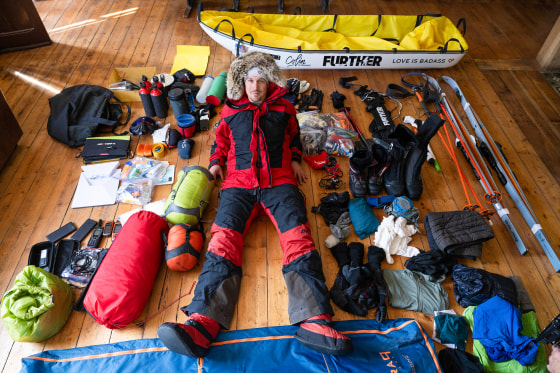Explorer Colin O’Brady is surrounded by duffel bags and dozens of neatly labeled bags of dried ramen while sitting down for a virtual interview from his Airbnb in southern Chile. That’s because the 40-year-old explorer is about to set off on what he says is his most ambitious expedition yet.
O’Brady will embark on a 110-day, 1,780-mile crossing of one of the most remote places on Earth — the Ross Ice Shelf, a frozen expanse at the edge of Antarctica.
“It was pretty funny going through Chilean customs with 14 bags full of protein powder,” O’Brady told NBC News on Oct. 31 as he gestured behind him. “They were like, ‘What the heck is this?’”
If successful, O’Brady would become the first person to cross the entire continent, from ice shelf to ice shelf, solo and unsupported. That means no resupplies, no kites and no dogs. It will just be O’Brady, a 500-pound sled and the endless white horizon.
He’s calling the expedition Further, which he hopes to begin this weekend.
“I’m really curious if I can go back and push myself not just farther in distance … but in a spiritual context — mind, body, soul,” he said days before he set off. “And to me, there’s no better proving ground for that than Antarctica.”
Twice as far, twice as dangerous
This is O’Brady’s sixth time on the southernmost continent, and his most perilous trip yet. In 2018, he became the first person to cross the landmass of Antarctica alone and unsupported, a 932-mile journey chronicled in his New York Times bestselling memoir “The Impossible First.” This time, he’s attempting nearly double that distance, roughly 1,800 miles across both the Ross and Filchner ice shelves, plus the landmass in between.
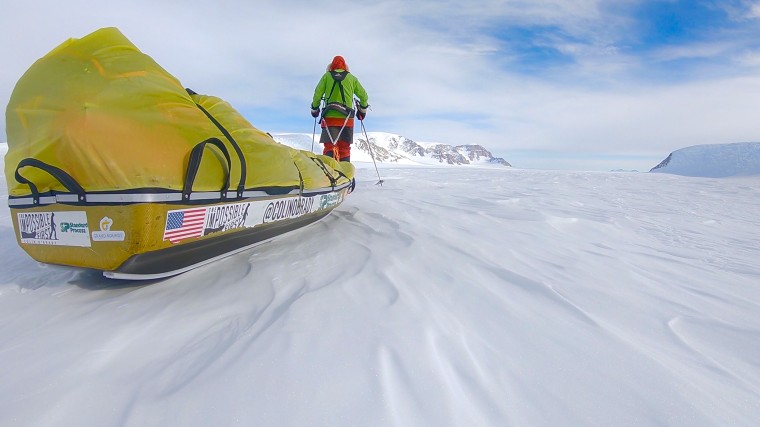
The route has the same starting point Norwegian explorer Roald Amundsen used in 1911, when he became the first to reach the South Pole. O’Brady will trace that history and then go far beyond it. Once he passes the 932-mile mark, every step he takes will be farther than any human has ever gone solo and unsupported on the continent.
But he knows how dangerous it will be to try and break this record.
“A couple years ago … I fell into a crevasse unroped and probably should have died. I was very fortunate to survive that crevasse fall and I’m going to have to go over similar terrain. So there’s no doubt about it that there’s real consequences, real threats,” he said. “You know, when you’re minus-40 degrees and your tent were to blow away, you’re in the middle of Antarctica without shelter or any really immediate hope of rescue.”
O'Brady's expeditions also come with the peril of public scrutiny. A 2020 National Geographic article accused him of embellishing and exaggerating key details in "The Impossible First." He strenuously denied the allegations at the time and called for National Geographic to retract the article, which the outlet has not done.
Asked on Friday if his new Antarctic attempt was an effort to silence those sorts of skeptics, he said, "The direct answer to your question is no, it has nothing to do with that."
"I remain super proud of what I accomplished in 2018 becoming the first person in history to cross the landmass of Antarctica, solo, unsupported (no reapplies), and fully human powered," O'Brady said in an email.
A record and a reckoning
O’Brady’s sled will weigh about 500 pounds when he starts. Nearly 400 of those pounds will be food and fuel. Enough for 110 days of travel, but barely sufficient to keep up with the 10,000 calories he expects to burn daily. “I’m starting this expedition at 205 pounds,” he says. “By the end, I’ll probably be down 60 or 70 pounds. I’ve gained all this weight just to survive.”
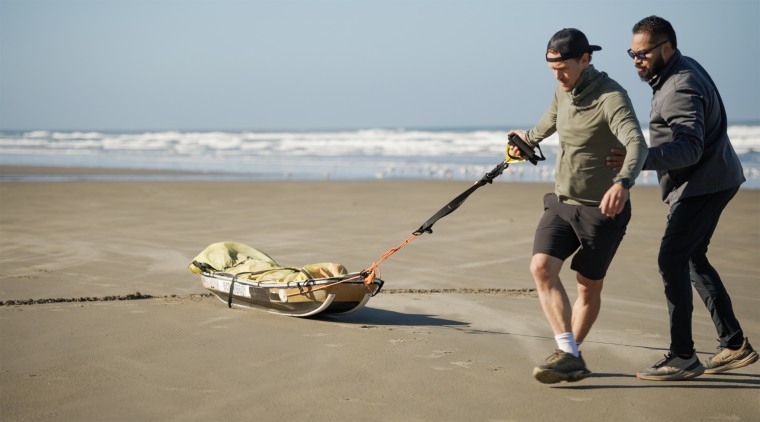
He’ll wear the same clothes every day, live on dehydrated meals and melt snow for water with a small gas stove.
“I have no change of clothes. I only have one pair of underwear that I’m putting on at the beginning, and they’ll still be on my body come to other side of the continent,” he said. “It’s not pretty out there.”
And yet despite the hardship — or maybe because of it — O’Brady says he finds peace in the isolation.
“Last time I was there, I pretty much deleted all my music and podcasts. I spent 95% of the time in complete silence,” he said.
“At first it’s very uncomfortable to be that alone,” he added. “There’s also nothing to see on this endless white landscape.”
O’Brady said it’s like “standing inside the belly of the pingpong ball.”
“It’s also the Antarctic summer,” he said. “What it means in the Antarctic summer is that it’s 24 hours of daylight. So it’s like high-noon daylight the entire time, but oftentimes — probably maybe 30% to 40% of the time — the clouds come in and you can’t see anything. I’m just navigating off a compass ... no way to see where you’re going, even a few steps in front of you.”
He’ll share updates through a Starlink Mini, a portable satellite unit that will allow him to transmit about one photo or message a day for his team to post to social media. Netflix is also following his journey for an upcoming documentary, directed by Academy Award winner James Reed (“My Octopus Teacher”).
“They’ve basically been living with me these last few months,” O’Brady said. “But once that plane takes off, it’s just me and the ice.”
Training for the unknown
To prepare, O’Brady created what he dubbed “Love Camp,” a seven-week training experience at an expansive oceanfront home in Oregon.
“I thought, well, what if instead of going alone into a training camp like a monk and just training hard, what if I did the opposite of that? What if I created an environment where I brought in all my friends, my family, my mentors, spiritual teachers,” he said.
“I had 60 different people come and stay with me in my house. Every morning we’d wake up and meditate together,” O’Brady said. “They would come on the beach and train with me. We would laugh, we’d play, we danced every single morning to the same song before getting started. We created these rituals. And there’s rituals now when I’m thinking about being alone on the ice.”
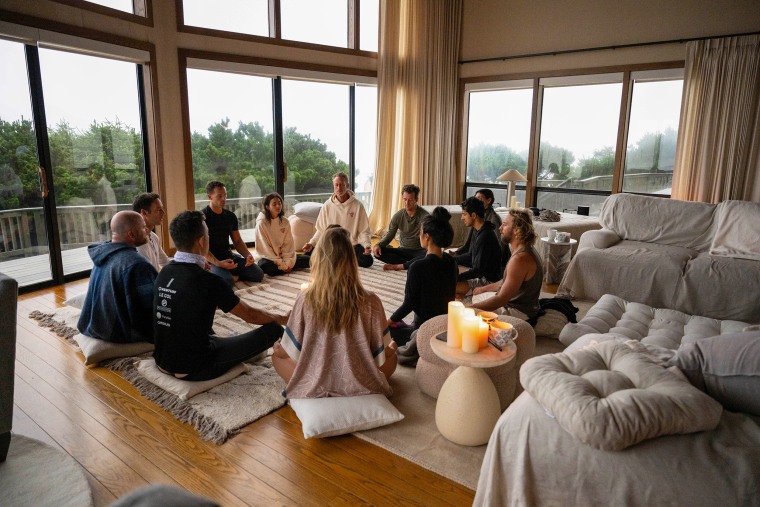
O’Brady’s small expedition team based in Chile and the U.S. includes his partner, Maryellis, who offers “love and support from a heart center place,” and longtime collaborators Gary Hand and Ali Rogers, who manage logistics, communication and media updates.
A legacy of risk
O’Brady isn’t naive about the dangers. British explorer Henry Worsley died in 2016 attempting a similar crossing. In a statement to NBC News, Worsley’s son Max said, “My mother, sister, and I wish Colin every success on this remarkable challenge. May the weather be favourable and, above all, may he stay safe and healthy throughout. We will be following along, and wish you the very best of luck, Colin!”
When O’Brady learned that Worsley’s family had wished him luck on this expedition, he grew emotional. “If it hadn’t been for him, I’m not sure I’d be making this crossing. He’s been a huge inspiration,” he said. “So to hear that from his family and have their blessing means the world to me.”
If something goes wrong, O’Brady does carry a satellite phone. A company called Antarctic Logistics & Expeditions would handle any emergency response. The company declined to comment on "private client travel arrangements."
Rescue, O'Brady cautions, is far from guaranteed.
“If there’s storms, no aircraft — even a ski aircraft — can land until the storm has cleared,” he said. “So if you call and you say, ‘Hey, I’m in the middle of the storm and my tent blew away,’ it’s not like they can come and get you. … It could be days, weeks until somebody’s there.”
But it isn’t the fear of death that keeps him up at night.
“I’m definitely afraid of dying. I’m not trying to take some crazy risk or something like that. But when I really put my head on the pillow at night, what I’m more afraid of is not fully living.”
From fire to freedom
O’Brady’s life story began with a very different kind of survival. In 2008, at 23, he decided to travel the world after graduating from Yale. While in Thailand, he was in a flaming jump-rope accident that left a quarter of his body burned so badly that doctors told him he might never walk again.
But O’Brady turned tragedy into triumph after his mother told him to set a goal. He set his sights on competing in a triathlon. Eighteen months later, he not only walked again, but O’Brady won the Chicago Triathlon.
“The doctors told me I may never walk again normally,” he said. “And that’s with me every step of the way. You know, when I’m out there in the middle of Antarctica and the storms are raging, I still have this place I can go to in my mind and it’s like, ‘Yeah, but you’re on your feet.’”
The father and the explorer
Now, as a father to 2 1/2-year-old Banks, O’Brady said his motivations have evolved.
“I have real things to live for — friends, family, community, my son,” he said.
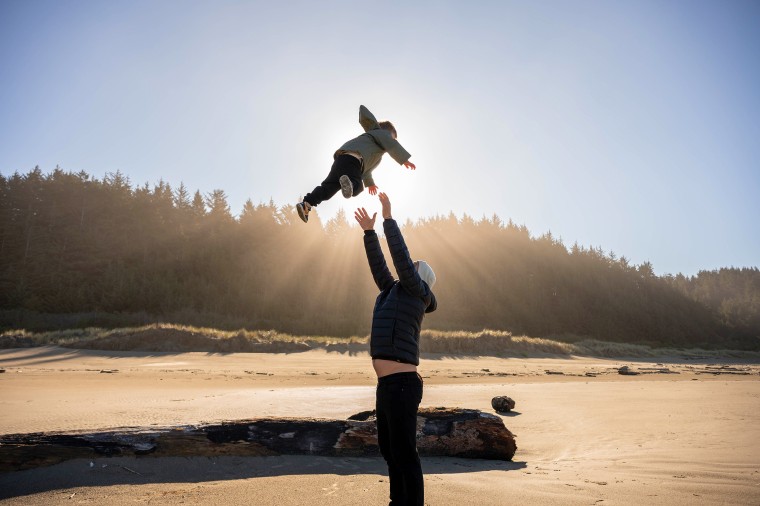
When Banks is older and watches the Netflix documentary, O’Brady hopes he’ll take away a simple message. “It doesn’t matter to me if Banks wants to climb mountains or walk across Antarctica. … I hope he looks at [the documentary and] goes like, ‘Wow, my dad dreamed big. What does that mean in my young life, and how can I go after things that I’m passionate about?’”
That connection extends to the planet itself
O’Brady said standing alone at the bottom of the world is “awe-inspiring and terrifying.”
“It’s like the full human emotion all wrapped up in one. ... It has literally brought me to my knees.”
“What keeps bringing me back is it’s basically like virgin Earth,” he said. “It’s like Earth before any humans ever touched it. Still, 99 % of Antarctica has never seen a human footprint, and that’s what makes it so special. … I’m not leaving anything behind. I treat the landscape with a high level of respect.”
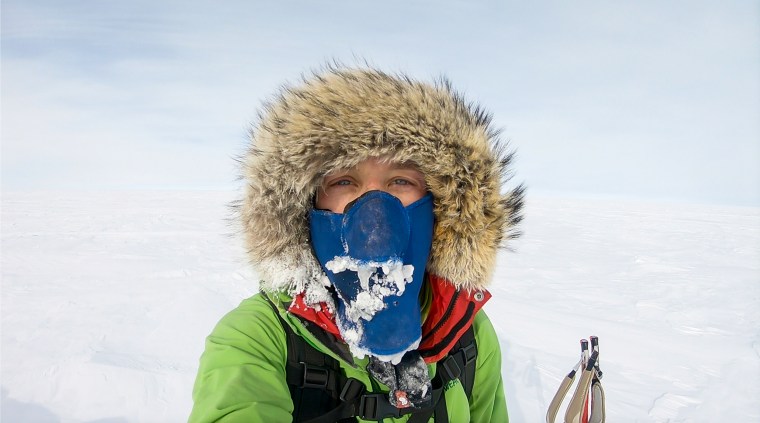
As he prepared to embark on his latest journey, O’Brady smiled.
“A couple of days ago when I was flying out of Portland to come down here, I actually went back and drove past my childhood home, which is a very modest home,” he said. “And just to think about where this all started and where I am now, I’m really proud of that.”
“As human beings, we’re sitting on reservoirs of untapped potential to achieve extraordinary things,” O’Brady said. “No matter where you come from, no matter what your background is, keep dreaming, keep chipping away, and keep having that zest for creating in life. It’s amazing what you can get to.”
